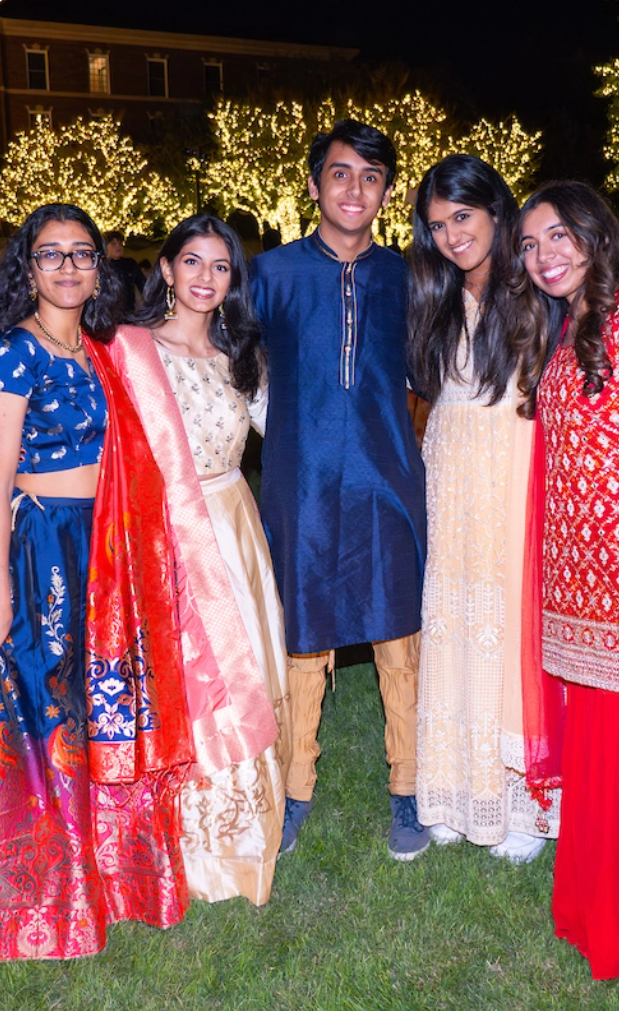Letters of Recommendation for Grad School: How to Ask & What to Include
What makes a good candidate stand out from a great one? Sometimes it can come down to a...

Please use the compass as a
resource as you navigate the
application process
Getting a master's degree brings your education and expertise to new heights — and for international students, completing a master’s degree in the USA can be a game-changer.
According to the Organization for Economic Co-operation and Development (OECD), in 2023 global professionals with a master's degree earned 35% more income than those with just a bachelor's. In America, high-quality academic programs and excellent career prospects increased the number of conferred master’s degrees by 19% from 2011-2021.
But the benefits extend far beyond finances.
A graduate degree empowers you to enter specialized fields, hone sophisticated skill sets, and build a competitive edge in today's global job market. Perhaps most profoundly, embracing the challenges of life in a new cultural environment will stretch and expand your comfort zones to make room for the experience of a lifetime.
It’s important to thoughtfully consider your interests, values, and long-term goals when choosing a master’s degree — you’ll also need resources to guide you through your journey. Here are a few examples:
Whether you’re interested in an MBA, a specialized research degree, or a degree that will help you transform the world around you, we're here to support you every step of the way on this exciting journey.

The U.S. is known for its leadership in innovation, creativity, diversity, and most especially for its financial opportunities, making it an interesting place to live and study. Students who study here reap the benefits of all of these positive qualities and more:
On a global scale, there’s no shortage of master’s degree career opportunities. According to the National Center for Education Statistics, the 2021 median earnings of those with a master's or higher degree were $74,600, some 21 percent higher than those with a bachelor's degree ($61,600).
We see the financial benefits of advanced education across many fields — like in computer science, where the earnings gap is particularly wide: bachelor's degree holders earn a median of $107,255 while their peers with a master's bring home an average of $118,290.
But how do master’s degree courses in USA-based institutions benefit international students?
Thankfully, salary advantages span across borders. In China, completing a master’s degree boosts your salary by nearly 80%.
And at multinational corporations and Fortune 500 companies that span the globe, the master's provides a respected, portable qualification for leadership positions worldwide. Firms like Accenture, IBM, Microsoft, Cisco, and Adobe all employ master's graduates in large numbers as technical, operational and business executives across international markets.
Countless roles require or strongly prefer a master's degree, such as social worker, economist, psychologist, political scientist, urban planner, and biostatistician. Many employers seek the specialized skills a graduate degree requires — and if you have one, they begin seeking you.
In globalized fields like technology and consulting, the master's serves as a recognized credential that increases employability worldwide. It demonstrates professional commitment and specialized expertise that top multinational firms value in their global talent pools — in other words, you can complete a master’s degree in USA-based industries, take it home, and then take it to the bank.
So you’ve decided to pursue your master’s degree abroad — but with so many reputable programs available in the United States, how do you choose which graduate program is best for you?
The best way to narrow down your list is through a little advanced research that compares what you want in a program with what a program has to offer:
Whether you’re looking to take your degree home or keep it in America, a university that fosters international study, supports a community of diverse students, and increases their career outlook will be a great fit, regardless of program.
SMU is ranked No. 33 worldwide for alumni employment among 20,531 institutions.
At SMU, international master’s applicants can take intensive English courses concurrently in their program. Select master’s programs can work through the Global Education Institute Program — and you can get in touch with an admissions counselor for direct, one-on-one guidance on understanding of all their resources. All other programs are welcome to explore SMU’s Intensive English Program, which offers instructions before you start your studies.
for alumni employment among 20,531 institutions
(Center for World University Rankings)
of best colleges for salary potential
(PayScale College Salary Report)
- Social mobility
(U.S. News & World Report 2023)
We know that applying to master’s degree programs from abroad can feel daunting. Breaking down the application and admissions process is the first step towards making it feel achievable. Here’s what a strong master’s degree application looks like:

Your application is a presentation of yourself on paper — your accomplishments, interests, research,
and work experience. A strong applicant will meet all of the master’s degree admission requirements and demonstrate a determination to advance their chosen field of study.
Generally, international applications must submit an online application and application fee, transcripts,
English proficiency test scores, GRE test scores, and letters of recommendation.
What makes a good candidate stand out from a great one? Sometimes it can come down to a...
Not all universities are created equal, though. Some universities offer more robust opportunities to make the dream of American graduate education more attainable than you first thought.
At SMU, international graduate students can receive direct support for finding financial assistance, ensuring applicants have the information they need at their fingertips. SMU assists students in finding on-campus jobs or work-study programs that can help offset living expenses, giving students a comprehensive financial support system.

Undoubtedly, graduate school is a major financial investment, but it doesn’t necessarily have to be...
It’s one thing to understand the master’s degree application process, but it’s another endeavor entirely to get accepted and prepare yourself for success. Here are our tips:
Potential is everything.
To increase your chances of getting accepted into a master's program, you need to demonstrate your potential to contribute and thrive in the academic community.
But how can you do this, regardless of what’s on your application?
Another way to demonstrate your potential is by visiting the campus, attending information sessions, and meeting with advisors or faculty members. This allows you to gain a better understanding of the program and the university culture, and it also shows your genuine interest in the program.
That’s why campuses like SMU regularly host in-person and virtual campus tours — so you can leverage your readiness to thrive alongside the community.
“Nothing worth having comes easy.”
Theodore Roosevelt, America’s 26th U.S. president, famously used these words while contemplating his political future.
The same could be said for attending a master’s program in America. Once accepted into a master's program, students will need to prepare for its rigorous academic demands.
Don't overlook the library.
Libraries provide extensive research materials, databases, and most importantly, a staff of expert librarians to answer your questions about your studies. SMU has 7 libraries that offer students a wealth of opportunity for study, research, and scholarly pursuit.
The library system at SMU also offers an online scholarly database with peer-reviewed articles and research that is accessible to all SMU students.
SMU boasts a thriving population of international students. In 2023, international students represented over 83 countries, with over 600 graduate students forming a supportive community.
To help our students from abroad make the most out of their degree and tap into a global community of scholars, SMU offers International Student & Scholar Services (ISSS).
For admitted international students, all members of the ISSS team work diligently to provide the best and most useful resources prior to your arrival and during your program.
But that’s just the beginning.
Both the ISSS Office and Moody Hall are places for you to tap into the SMU graduate community, with graduate student social hubs, international leadership programs, academic resources, and scholars from around the world to connect with and learn from.

So you’ve started preparing to tackle your master’s degree in America, but what do you do if you want to stay after graduation?
Optional Practical Training allows international students on an F-1 visa to apply their classroom knowledge through practical work experience directly related to their field of study. In simple terms, OPT transforms classroom learning into professional expertise and opens the door to the American job market.
For thousands of international students each year, OPT provides up to 12 months of practical training after graduation for those who meet eligibility requirements. For those with STEM degrees, there's an opportunity to extend OPT for an additional 24 months — allowing a total of 36 months of real-world experience. This extended STEM OPT helps graduates develop deep expertise in their chosen field.
An American master’s degree can take your future career to the next level. Knowing how to wield your degree to reach even higher heights is the cherry on top.
That’s where the career center comes in. Resume assistance, job search strategies, and networking opportunities can be yours if you know how to ask, and who. SMU’s career services provide free personal career advising sessions and a variety of on-demand resources to students.
Even though arriving in America is an exciting moment, it can also be a challenging one. People who immigrate to the U.S. may experience things like culture shock, language barriers, and even new allergies or illnesses.
But adapting to your new life doesn’t have to be an uphill climb. In many American cities, people who understand what you’re experiencing will lend a hand.

Living in the vibrant Dallas-Fort Worth metroplex, international graduate students are surrounded by a rich tapestry of international communities and organizations that celebrate cultural diversity. These groups provide valuable support networks for students and professionals alike as they navigate life far from home.
The DFW International Community Alliance brings together over 1,600 organizations across Dallas and Fort Worth. This vast network promotes and embodies our region's dynamic global community—a true celebration of cultures and economies from around the world. It serves as an umbrella group supporting the many international organizations and communities that make North Texas so unique.
Imagine a vibrant, multicultural neighborhood where you can live, work, play, and experience the world. The Dallas International District aims to make this dream a reality in the heart of the city. This innovative urban development provides residential, commercial, and public spaces tailored to our international communities, honoring their rich heritages.
For international residents in Dallas, InterNations Dallas provides a space to build community. They host engaging social events and meetups that foster networking and lasting connections—a taste of home for those temporarily living abroad.

Did you know the Indian American community in Dallas-Fort Worth includes over 235,000 individuals?
That's roughly 3% of the Dallas metro area's total population, making it one of the largest Indian American populations in the United States. For students who want to tap into the professional community, Dallas features South Asian professionals across diverse fields like medicine, engineering, and information technology.
India Association of North Texas (IANT)
The India Association of North Texas serves the cultural and educational needs of the local Indian American population. Although not exclusively for students, IANT's diverse activities and events cater to all ages, providing a sense of community for Indian graduate students in Dallas.
Locally on the SMU campus, the Indian Student Association is active with extensive opportunities for community.
Rising above the tree line of the town of Pearland, a suburb of Houston, stands a brilliant white tower. This grand entrance, or gopuram…
The Dallas–Fort Worth area's vibrant Chinese population, encompassing both recent immigrants and multigenerational Chinese Americans, forms an integral part of our region's diverse human ecosystem. The community boasts deep roots, with Chinese Americans settling here as early as the late 1800s. Over decades, it has continued to grow and evolve into the thriving, multifaceted community we see today.
Dallas Chinese Community Center (DCCC)
The Dallas Chinese Community Center is a place celebrating Chinese heritage. They offer diverse programs like health and wellness events, cultural festivals (including Lunar New Year celebrations), educational courses, and a public library dedicated to Chinese literature and media. These resources foster community while honoring rich traditions.

Even with so much information available, it can be hard to find the answers to your questions in one place. Take a closer look at some of SMU’s most frequently asked questions from our international students and applicants:
While the GRE is commonly required, we have a holistic admissions process that considers your full application package. Many programs offer GRE waivers based on criteria like work experience or undergraduate GPA, so be sure to check your intended SMU master’s program.
We recommend applying to 3-5 programs that align with your interests and qualifications. Carefully research each program to ensure you're a competitive candidate.
You're welcome to apply to multiple SMU programs, but you must submit separate applications and application fees for each. Be mindful of application requirements and deadlines.
If you need to postpone your admission, please connect with your program to discuss deferral steps.
Know that you're never alone — we're committed to your success. Utilize resources like academic advising, tutoring services, and more. Your professors are also valuable allies.
If you need to discuss further options, you can make an appointment with the International Student & Scholar Services to access compassionate resources and an expert to help you determine next steps and solve the challenges you might be facing.
We know that embracing the opportunity to study in the USA is a big decision, but it’s easier with a supportive campus of thriving international students, faculty, and local community by your side. By experiencing the breadth of cultures and ideas in Dallas, you'll not only expand your academic horizons but also forge unforgettable memories and lasting connections — and we can’t wait to welcome you!
To learn more about studying in Dallas and the vibrant opportunities it offers, check out our comprehensive guide, The Graduate Student's Guide to Living in Dallas.